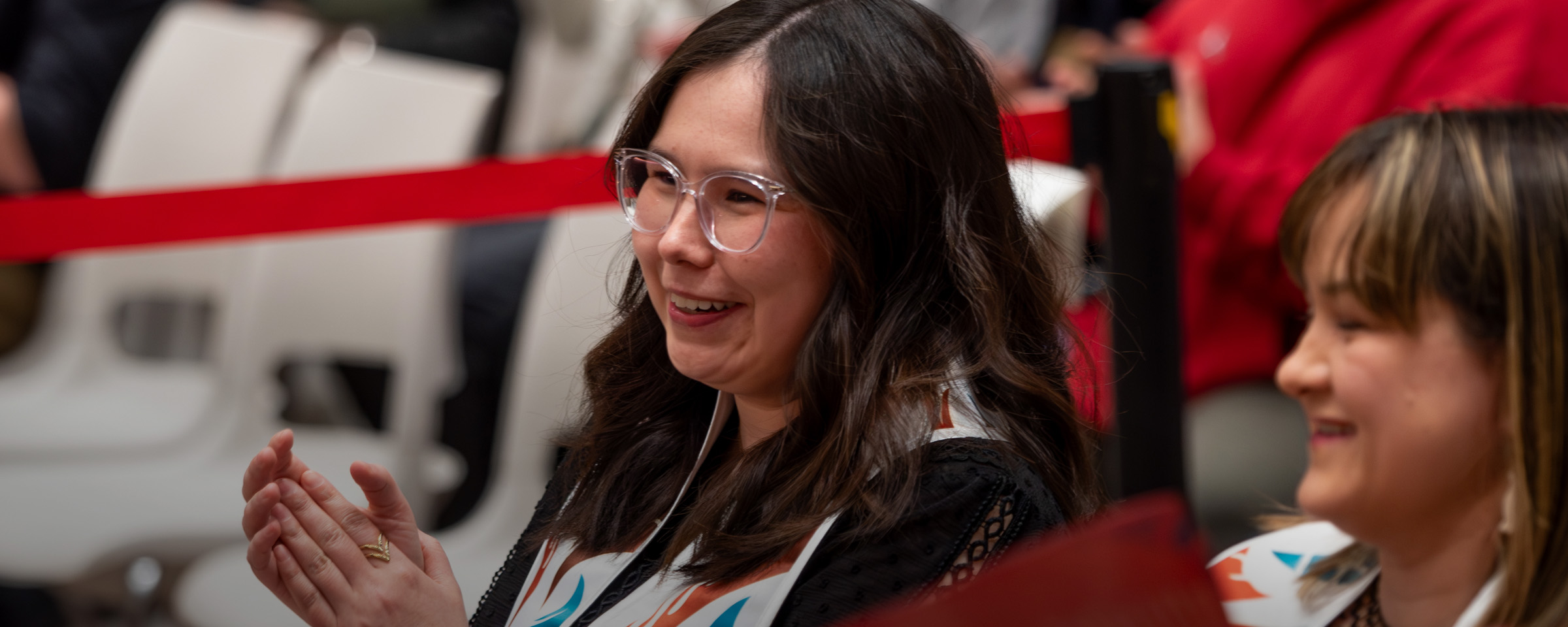


Posted: February 18, 2026
Posted: February 12, 2026
If you have previously applied but did not include the one-page essay, please know that your application is not complete but don’t despair there is still time as the extension date has been extended to February 27, 2026. Please send your essay submission, your full name and student number to financialaid@rrc.ca and they will add it to your earlier submission.
Mínwastánikéwin is a Cree word that means ‘to set it right.’
The Mínwastánikéwin Truth and Reconciliation Award was made possible through collaboration between Truth and Reconciliation and Community Engagement, College and Public Relations and the Campus Store. The award is funded by the generous support of RRC Polytech students, staff and faculty through campaigns at the RRC Polytech Campus Store that bring awareness to Truth and Reconciliation and Indigenous-led initiatives such as Orange Shirt Day and Missing and Murdered Indigenous Women, Girls, and Two Spirit People Honouring and Awareness Day.
This award is for Indigenous full-time students. Recipients will be selected based on an essay response on what Truth and Reconciliation means to them. To be eligible, applicants are required to submit a General RRC Polytech Application, proof of Indigenous heritage, and a one-page essay submission. Completed application forms should be submitted by email to financialaid@rrc.ca.
Extended Deadline: February 27, 2026
If you have any questions, please attend one of two information sessions being held at both the Notre Dame Campus and the Exchange District Campus:
Posted: January 7, 2026
Elder Angela Roulette is a familiar face at schools in Portage la Prairie and a regular at the RRC Polytech Portage Campus. She brings traditional Teachings and stories to students of all ages – to children in grade schools and adults in post-secondary like RRC Polytech. She began her work with the Polytech over a year ago when she had offered a traditional prayer at convocation for the Portage Campus.
Room 2-16 on the second floor of the Portage Campus is home to a variety of events. Cultural gatherings, consultation sessions, and group meetings make use of the circular tables, where everyone is invited to sit at the same level. The ventilation system is a welcome function to allow for smudging in the space.
So, when Portage Campus recognized that the room could be a fitting space to carry an Indigenous name, the Polytech immediately turned to Elder Roulette.
Guy Moffat, regional manager for Portage Campus, approached Elder Roulette and offered Tobacco with the request for a name for the space.
On Wednesday, December 10, Elder Roulette gathered with a group of RRC Polytech staff and members of the Portage community, including city councilors and the mayor to conduct the Ceremony to welcome the name into the space. Elder Roulette said a prayer in Anishinaabemowin before everyone was invited to smudge. Introductions went around the table and Elder Roulette shared the story of how the name Mushkode Pizhikeh came to be.
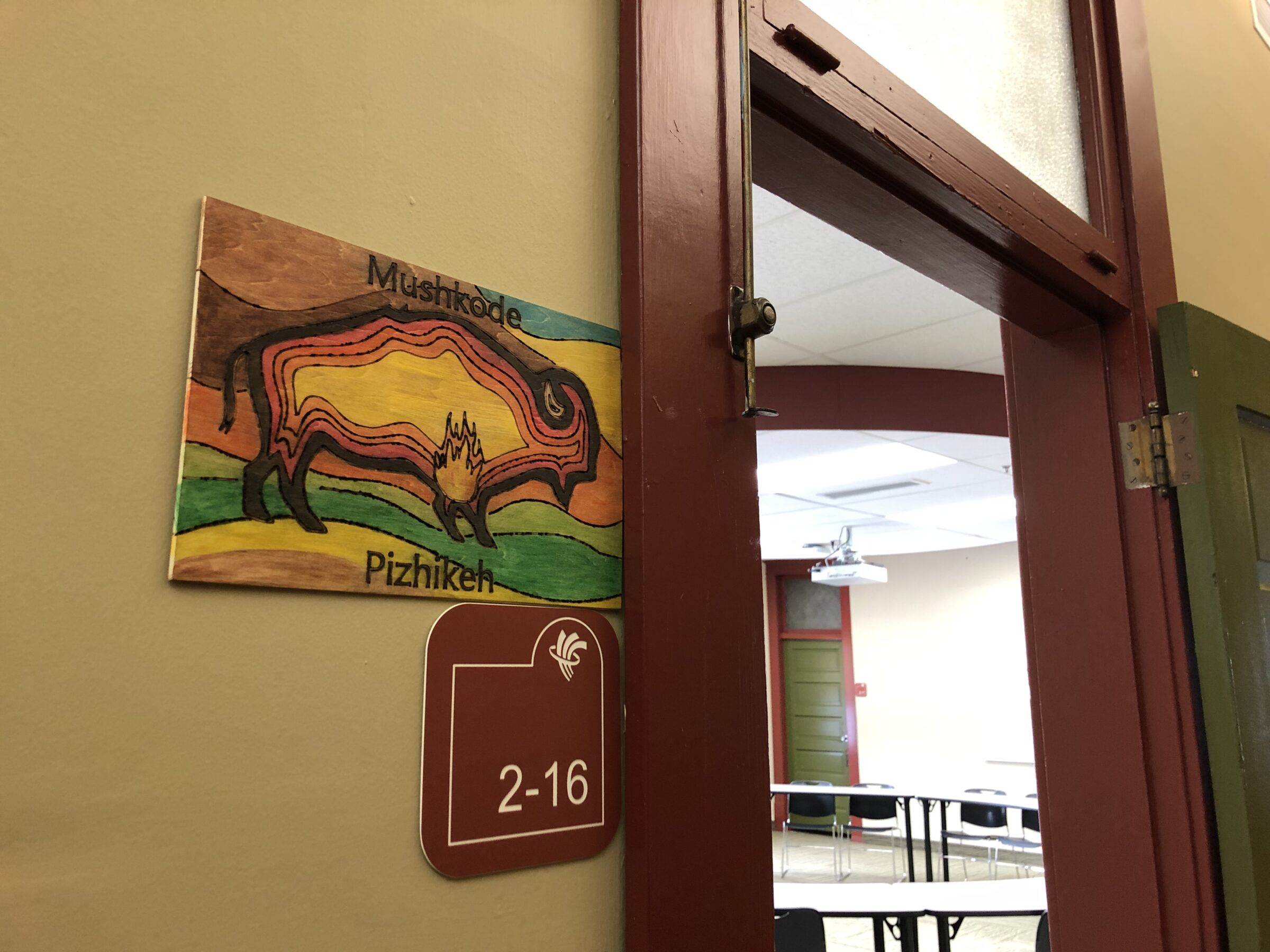
“The bison represents respect,” said Elder Roulette. “This space – what it should be about is respect. People care about this space, they keep it clean, keep it free from vandalism.”
Elder Roulette says that while in consideration for the name, she remembered something she had learned a long time ago: she needs to listen. Listen to Creator, listen to signs around her for guidance. She shared that when she was considering the name, she was inspired by a gift from her late sister: a keychain in the shape of a bison. It’s a gift from someone she loved dearly.
Elder Roulette, a fluent Anishinaabemowin speaker, decided that the room would be called Mushkode Pizhikeh – which means Bison-Fire in English.
After determining the name for the space, Elder Roulette knew she had to gather some advice on how the word should be written. She is a fluent speaker who learned the language the way that her ancestors spoke, so she wasn’t entirely sure how the word should be spelled using English letters.
She consulted with the Manitoba Indigenous Cultural Education Centre and the Chief of Sandy Bay First Nation to determine how the word should be spelled, and they came up with: Mushkode Pizhikeh.
During the Ceremony, Elder Roulette presented a jar of clear water. She explained that she had filled the jar of water four years ago when she had met Rachel Templeton, office manager for the Portage Campus, and by the time the jar made it to the Polytech for the Ceremony, about a sixth of it had evaporated from the sealed jar.
Elder Roulette shared that the jar represents the importance of water. It represents the teachings these walls will witness in the future.
“In this educational place, they might just see a jar of water. But it’s important to remember that water is life. I tell that to all the kids in this town,” said Elder Roulette.
When thinking about the bison and the respect it represents, Elder Roulette also noted that the sun, the energy of that fire within, the inspiration that drives us to learn, are all things that are present in this place of education.
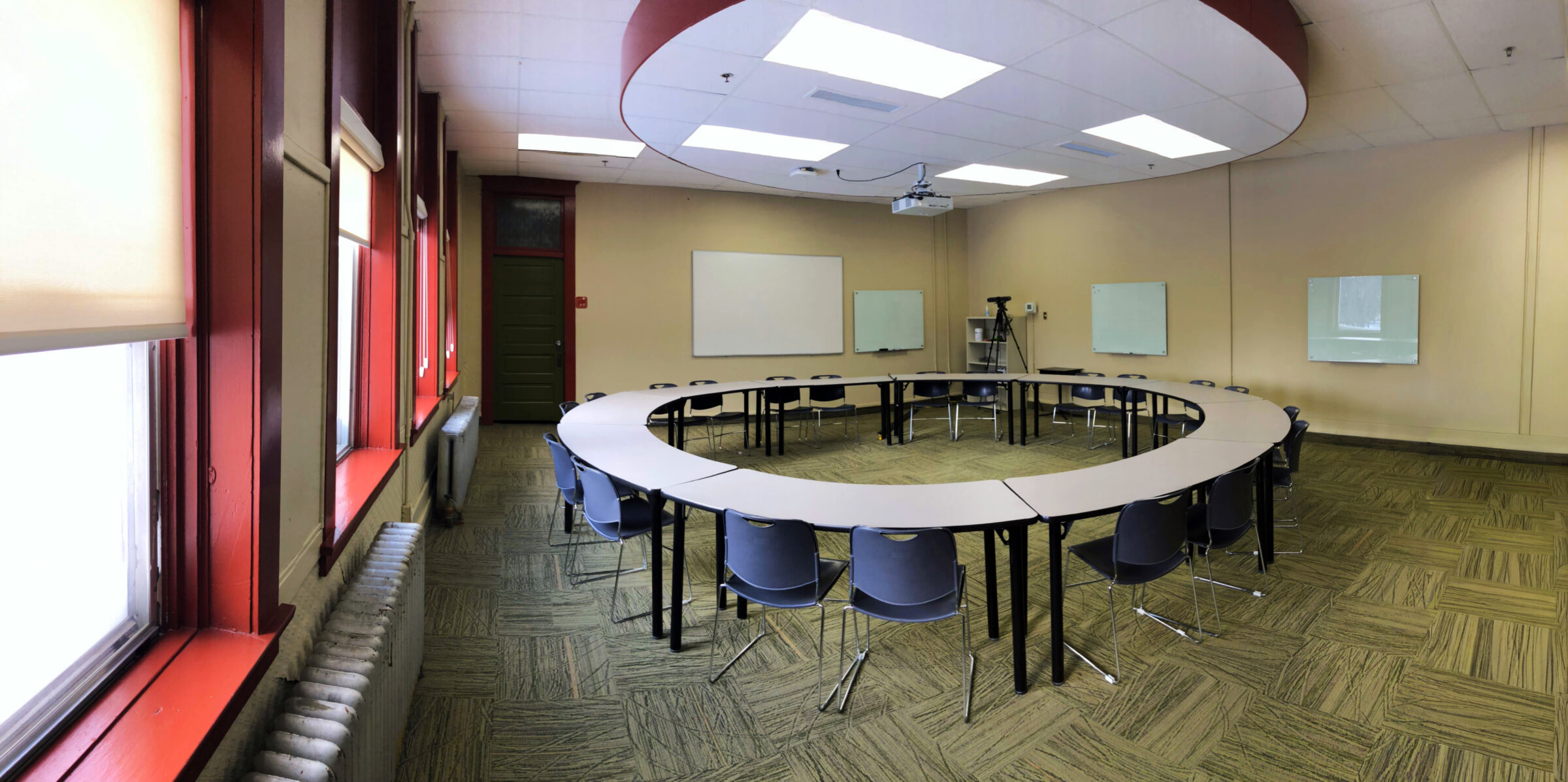
The Ceremony concluded with a Feast and conversation in Mushkode Pizhikeh to honour the new name.
Staff are very excited and proud to welcome Mushkode Pizhikeh into a space where people connect.
“As a staff member, I believe building relationships with Elders like Elder Angela helps create familiarity and a sense of belonging. Many Indigenous students leave their home communities to attend college, so having a piece of home here, someone they can talk to who carries cultural knowledge and wisdom can make a big difference. It helps our college feel more welcoming and connected. It’s about turning spaces into communities,” said Rachel Templeton, office manager for Portage Campus.
Moffat says that they’re hoping to have an Indigenous Elder like Roulette or another Knowledge Sharer on-campus at least once a month going forward to enrich students’ experience at the Polytech.
“Portage La Prairie has a very high population of Métis people and four of our closest neighbours are First Nation Communities, which allows us at the Portage Campus to have many opportunities to build relationships with Indigenous groups. I am also a member of Suta Kachicha (Portage Urban Indigenous Peoples Coalition) and we work hard to build relationships so that Elders, Olders, and Knowledge Sharers can work time into their schedules to spend time with the students at the Portage Campus,” said Moffat.
Portage Campus is looking forward to creating a Culture Corner in the student lounge with the help of Elder Roulette and other community Knowledge Sharers, where Indigenous arts, books, and other resources will be displayed.
Posted: January 4, 2026
January 4 is Ribbon Skirt Day, a day to honour the beauty, strength, and resilience of Indigenous women, girls, Two-Spirit, and gender-diverse people.
Ribbon skirts are more than clothing – they are Ceremonial and cultural garments that carry teachings, identity, and pride. For Indigenous Peoples, our Ceremonial clothing is our formal wear. It reflects who we are, where we come from, and the responsibilities we carry.
Ribbon Skirt Day was established after Isabella Kulak, a young girl from Cote First Nation, was shamed in 2022 for wearing her ribbon skirt to school in Saskatchewan. What had been a moment of harm became a powerful movement of love and solidarity, affirming that Indigenous Peoples have the right to wear their cultural regalia with pride and without discrimination.
Wearing ribbon skirts and other traditional regalia is an expression of culture, sovereignty, and belonging. These garments deserve to be respected in all spaces – schools, workplaces, and public life – just as any other form of formal attire is respected.
On Ribbon Skirt Day, we celebrate cultural pride and stand against discrimination, affirming that Indigenous identities and traditions are to be honoured every day.
Posted: December 11, 2025
RRC Polytech’s Emerging Media and Production team is collaborating with Ininew artist and Artist-in-Residence Heather Endall and the Truth and Reconciliation and Community Development department to create Reflections on Racism, an immersive 360º installation that blends Indigenous storytelling, traditional art, animation, and sound. Centered on Michael Hutchinson’s How the Dog Learned to Dance, the project invites viewers to reflect on racism, empathy, and allyship while embodying Universal Design for Learning through accessible in-person, VR, and online formats. Through Endall’s powerful artwork and lived experience, the installation becomes a space for community voices, introspection, and meaningful dialogue on anti-racism at RRC Polytech.
Posted: November 28, 2025
The Gwen Cook Memorial Award was created to honour the memory of Gwen Cook (Bimosekwe) who was a founding Grandmother of the Manitoba Moon Voices Inc.’s (MMVI) Grandmother Advisory Circle.
The Gwen Cook Memorial Award will be presented to an Indigenous woman or gender diverse individual who is enrolled in post-secondary studies in Manitoba, is a member of MMVI, and exemplifies the qualities of the late Gwen Cook.
The $1,000 scholarship is intended for a person who is enrolled in post-secondary studies with a minimum 60% course load (9 credit hours per Fall and Winter term).
Eligible applicants must complete the application and submit it to MMVI
By email:
admin@mmvi.ca
By mail:
Swan Lake First Nation #8A Business Centre
165-200 Alpine Way, Headingly, MB
R4H 0B7
Applications must be received by 4:30pm Friday, January 2, 2026.
Completed applications must include:
Gwen was a proud Maskgeko Anishibaabe Ikwe who was born in The Pas, MB and grew up in Flin Flon and Cranberry Portage, MB. She was a loving mother, sister, grandmother and friend who had a strong and gentle spirit.
Gwen was a leader in the community who adhered to traditional practices, values and leadership. Education was important to Gwen. She attained her Bachelor and Master of Social Work and was pursuing a Doctoral degree before her passing.
Gwen worked in Winnipeg for forty years at various organizations where she loved working with people. She contributed to the community by volunteering on various boards like Ka Ni Kanichihk and the Grandmothers Working for Good Life Council. Gwen was also a committee member of the Master of Social Work Indigenous Knowledge Program (U of M). She provided expertise in social services and shared her traditional knowledge.
Gwen was an active member of the Three Fires Midewin Lodge for over twenty years and was a fourth degree Midewin woman.
Reclamation of the Anishinaabe traditional way of life was essential to Gwen and she encouraged others in their own healing.
Posted: November 17, 2025
RRC Polytech is introducing the new Environmental Studies and Land Relations diploma program – a scientific, land-based program that combines environmental science, fieldwork, and Indigenous knowledge in meaningful, practical ways. This program is designed for learners who want to work directly with the land and support communities. Classroom learning blends with land-based experiences, hands-on research, and Work-Integrated Learning opportunities across Manitoba.
Throughout the program, students gain essential technical abilities in laboratory work, field sampling, safety practices, and wilderness preparedness across seasons. Courses connect environmental testing with Indigenous knowledge, led in partnership with community Knowledge Keepers and industry advisors. Students develop skills in data collection, environmental assessment, and monitoring of land, water, soil, and biodiversity, which will prepare them to support sustainable resource management with cultural respect. Using a Two-Eyed Seeing approach, students will learn to evaluate environmental impacts, work with community frameworks, and consider reconciliation and sovereignty in environmental planning and management.
The program emphasizes communication and career readiness. Students build practical skills in writing, speaking, digital fluency, and job preparation, including resumes, interviews, and workplace collaboration. These skills support success in the environmental sector and help students navigate evolving roles in conservation, consulting, and community-based research.
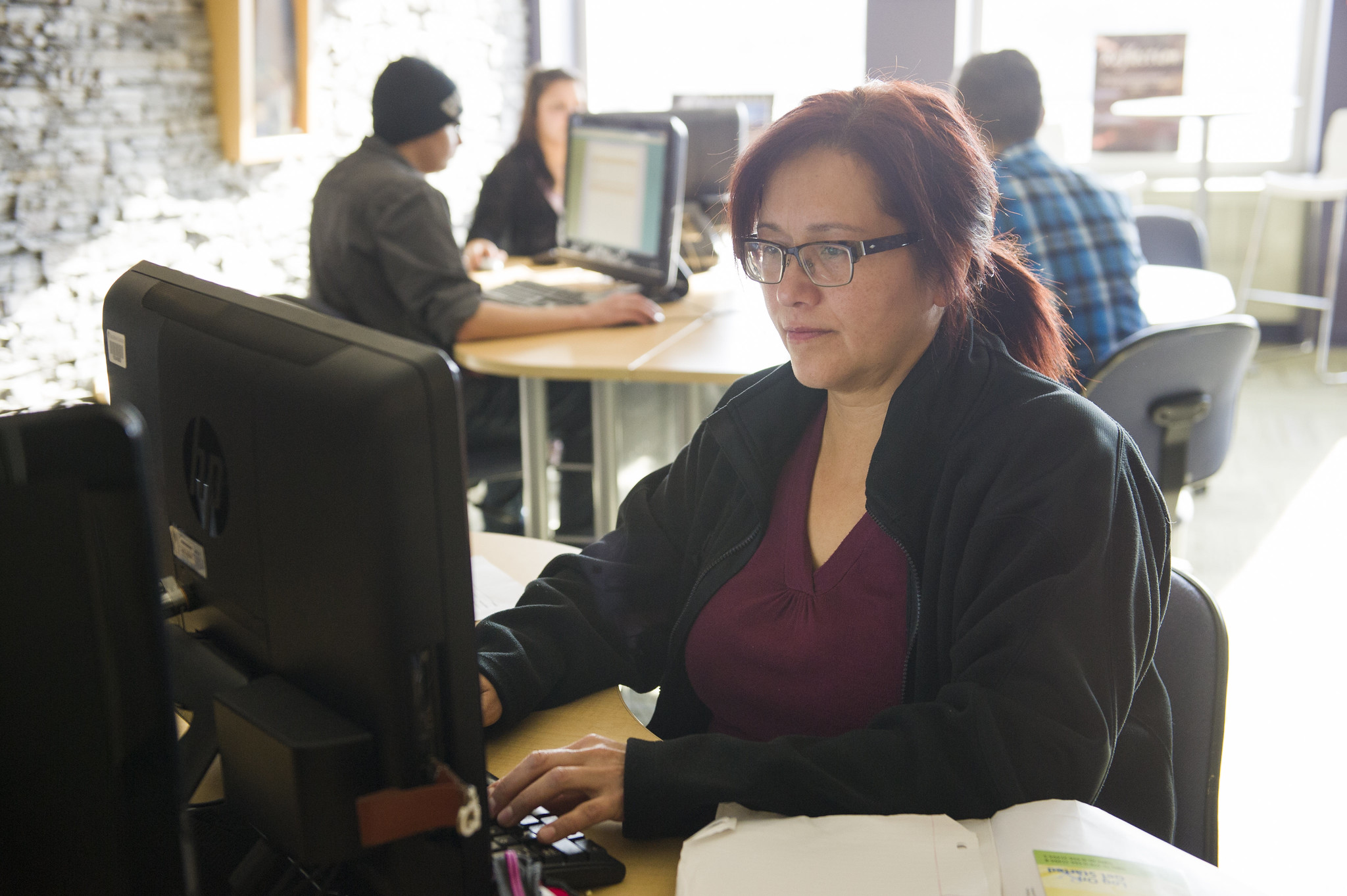
Students participate in a Work-Integrated Learning (WIL) opportunity, where they will gain real-world experience with community or industry partners. Whether choosing a paid co-op placement or collaborating on a full-term community or industry research project, students will apply their skills in environmental monitoring, conservation, and land stewardship while developing professionalism, collaboration, and confidence in their chosen field.
Graduates leave with the ability to build relationships with communities, analyze complex environmental issues, collaborate in research, prepare policy recommendations, and support decision-making processes that honour Indigenous rights and land connections. With a strong foundation in science, Traditional Ecological Knowledge, and applied fieldwork, the Environmental Studies and Land Relations diploma program equips students to become knowledgeable and ethical environmental practitioners committed to stewardship, sustainability, and reconciliation.
| Term 1 – Fall |
| Foundations of Environmental Studies and Indigenous Knowledge Field Skills in Wetland Ecology and Land Relations Sustainability, Truth and Reconciliation Communication for the Workplace Indigenous Knowledge and Environment Industry Skills 1 |
| Term 2 – Winter |
| Indigenous Stewardship and Environmental Assessment Communication Strategies Environment Studies Policy, and the Natural World Fieldwork and Preparedness 1 Indigenous Knowledge and Environment Industry Skills 2 |
| Term 3 – Summer (year 1 or 2) |
| Workplace-Integrated Learning Paid co-op or Community industry research project |
| Term 4 – Fall |
| Forestry Stewardship Land Use Planning and Resource Stewardship Environmental Education and Public Policy Indigenous Knowledge and Environmental Industry Skills 3 Environmental Business Development and Entrepreneurship |
| Term 5 – Winter |
| Forestry Stewardship Land Use Planning and Resource Stewardship Environmental Education and Public Policy Indigenous Knowledge and Environmental Industry Skills 3 Environmental Business Development and Entrepreneurship |
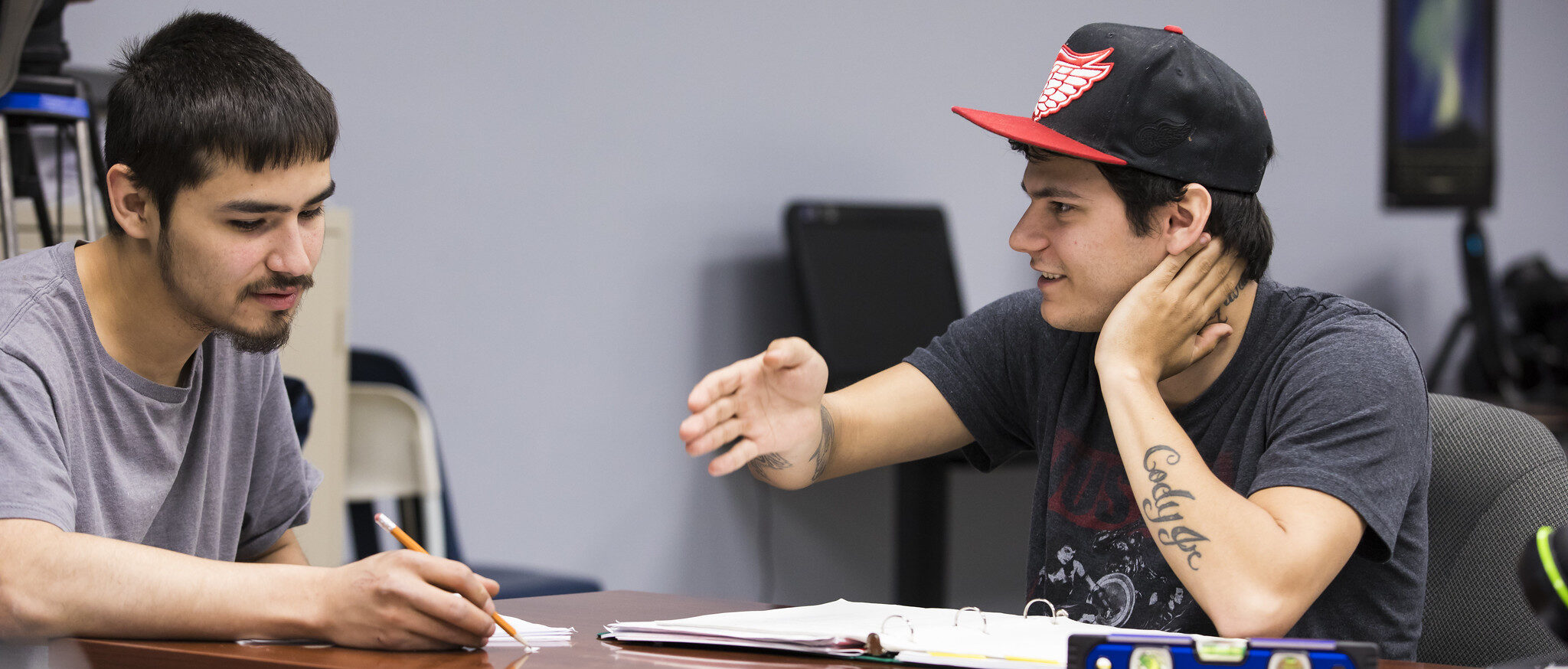
Graduates of the program will be prepared for careers in:
Applications for Fall 2026 will open in February 2026 when the Program Explorer and Catalogue has been updated. Subscribe to this blog to get automatic updates right to your inbox! Scroll the list and select “Indigenous Education.”
For more information on the application process and admission requirements, contact the Indigenous Academic Advisor at indigenous.advisor@rrc.ca.
Posted: November 7, 2025
Each year on November 8, communities across Canada gather for ceremonies and vigils to honour the contributions and sacrifices of Indigenous veterans. These events offer a moment to reflect on the long-overlooked experiences of Indigenous peoples in Canada’s military history.
During wartime, Indigenous soldiers served with courage and distinction. Yet, when they returned home, many faced systemic discrimination. Reserve lands were taken by the government — some later granted to non-Indigenous veterans as farmland — while Indigenous veterans were frequently denied the same benefits and support programs offered to others. In some cases, they were pressured to “enfranchise,” a policy that required them to give up their Indian Status and cultural identity in exchange for Canadian citizenship and its associated rights.
It wasn’t until 1994, when Indigenous veterans and their families began advocating for recognition, that these injustices began to gain wider attention. Their efforts sparked a national conversation and helped pave the way for the commemorations we see today.
Now, Indigenous service members are acknowledged and celebrated at all levels for their vital role in shaping Canada’s military legacy. November 8 is not only a day of remembrance — it’s a call to honour truth, resilience, and the ongoing journey toward reconciliation.

To recognize, acknowledge, respect and remember what Indigenous veterans did for our country, we are gifting staff & students commemorative pins.
Pins can be picked up from the Notre Dame Campus Indigenous Student Support Center (F205).
Stop by 12:00pm-2:00pm to collect your pin.
Posted: October 29, 2025
Are you an Indigenous learner interested in a career in business, technology, communications, or engineering but not sure where to begin? RRC Polytech’s Pathway Programs are designed to help you take that first step. These programs nurture your skills, build your confidence, and prepare you for success in full-time diploma studies — all while connecting you to a supportive community that wants to see you thrive.
Join us for the Pathway Programs Information Session on Tuesday, November 4, 2025, from 6:00–7:00 p.m. at 2055 Notre Dame Ave (Room F205) to learn how you can start your journey.
Each Pathway Program helps you explore your interests, develop essential academic and technical foundations, and access mentorship and career-focused supports. When you complete a pathway, you’ll be ready to apply for reserved seats in related diploma programs, setting you up for continued success.
If you’re a storyteller, creative thinker, or entrepreneur at heart, this pathway helps you develop the skills to turn your passion into a profession. You’ll explore exciting fields like business, hospitality, marketing, journalism, media production, and digital media design while gaining the learning strategies and technical foundations to succeed in post-secondary education.
After completing this pathway, you’ll be eligible to apply for limited reserved seats in:
If you’re curious about how things work — from bridges and buildings to engines and electrical systems — this pathway helps you prepare for a future in civil, electrical, mechanical, or power engineering technology. You’ll strengthen your math, science, and problem-solving skills while gaining hands-on experience that connects classroom learning to real-world applications.
After completing this pathway, you’ll be eligible to apply for limited reserved seats in:
Interested in shaping the digital world? This pathway helps you build the foundation for a career in information technology, where you can explore areas like software development, cybersecurity, or IT systems management. You’ll develop the technical skills and confidence to move forward in a rapidly evolving, high-demand industry.
After completing this pathway, you’ll be eligible to apply for limited reserved seats in:
RRC Polytech’s Pathway Programs are more than just a stepping stone — they’re a launchpad for your career and personal growth. They provide a supportive learning environment that honours where you’re coming from and helps you build toward where you want to go.
Come connect with instructors, advisors, and Indigenous supports who will walk alongside you as you move from Pathway to diploma — and into the industry of your choice.
Pathway Programs Information Session
Posted: October 9, 2025
General RRC Polytech Application Required
The deadline to submit applications for the Mínwastánikéwin Truth and Reconciliation Award is January 31, 2026.
The Mínwastánikéwin Award honors the resilience, strength, and voices of Indigenous students at RRC Polytech. Supported by the College community through campaigns raising awareness of Indigenous-led initiatives like Orange Shirt Day and Missing and Murdered Indigenous Women, Girls, and Two Spirit People Honouring and Awareness Day, this award celebrates reflection, culture, and the ongoing journey of Truth and Reconciliation.
In 2025, Dakota artist Dasia Chatkana’s Orange Shirt design, showing a trail of footprints into a dark forest, pays tribute to children who survived Residential Schools, while Métis artist Shayre Curé’s Red Shirt, featuring a handprint over a woman’s mouth, honors Missing and Murdered Indigenous Women, Girls, and Two Spirit People.
Indigenous full-time students can apply by submitting proof of Indigenous heritage, a General RRC Application, and a one-page essay on what Truth and Reconciliation means to them. The deadline is January 31, 2026, via email to financialaid@rrc.ca. Last year, the award celebrated the voices of Kayla Frobisher and Elizabeth Ford.
For full details, see the Awards, Bursaries, and Scholarships Catalogue.
RRC Polytech campuses are located on the lands of the Anishinaabeg, Ininiwak, Anishininwak, Dakota Oyate, and Denésuline, and the National Homeland of the Red River Métis.
We recognize and honour Treaty 3 Territory Shoal Lake 40 First Nation, the source of Winnipeg’s clean drinking water. In addition, we acknowledge Treaty Territories which provide us with access to electricity we use in both our personal and professional lives.